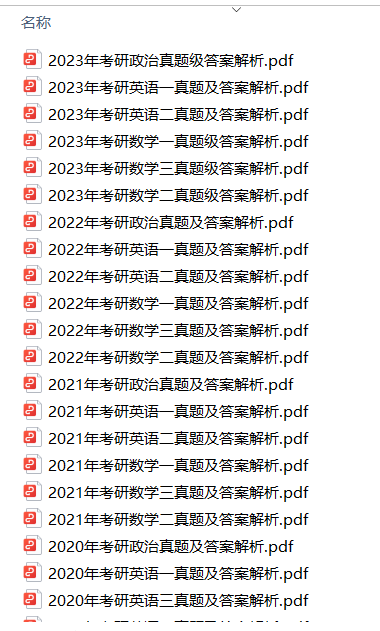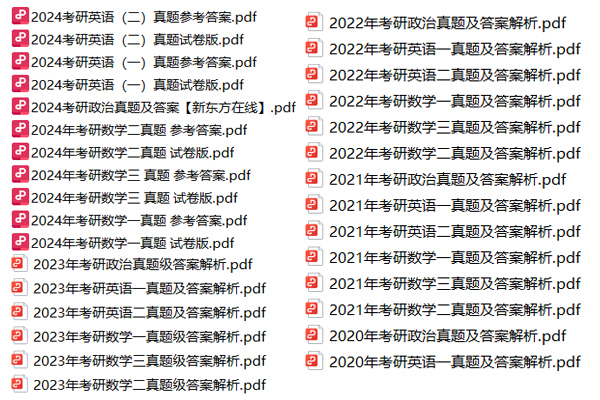特惠-26考研冲刺
特惠-27考研课
双证-在职硕士
免联考-同等学力
复试分数线
26复试全面指导
模拟复试面试
26考研-全套真题
26考研估分
保研-路线图
27考研-智能择校
27考研-英语测评
27考研-新大纲对比
热门-计算机择校

扫码加入训练营
牢记核心词
学习得礼盒
背单词的方法很多,考生要根据自己的记忆曲线结合各种适合的方法,其中词根词缀是比较科学的记单词方法,掌握了大有益处。本文新东方在线分享一些高频词根,大家记一下:
词根:cide, cis = cut, kill 切,杀
1. precision
助记:pre + cis(切)+ ion(名词后缀)→像用刀切过的一样→精确
释义:n. 精确,精密度,精度
举例:
These instruments are capable of very high precision.
这些仪器可以达到很高的精密度。
2. incisive
助记:in(向内)+ cis(切)+ ive →深刻的
释义:a. 深刻的,尖锐的,激烈的
举例:
He gave a clear and incisive presentation of the matter.
他对整件事做出了一个清楚而又深刻的描述。
3. excide
助记:ex(出)+ cide(切)→切出去→切除
释义:vt. 切开,切除,删除
举例:
It is necessary to excide the tumor in time.
及时切除肿瘤是很有必要的。
4. suicide
助记:sui(自己) + cide(切,杀)→自己杀自己→自杀
释义:n./vi. 自杀 a. 自杀性的
举例:
For one reason or another, she committed suicide.
不知什么原因,她自杀了。
5. homicide
助记:homi(人) + cide(切,杀)→杀人
释义:n. 杀人,杀人者
举例:
He has been charged with homicide.
他被控告杀人。
6. patricide
助记:patri(父亲)+ cide(杀)→杀父
释义:n. 杀父
举例:
Cultural patricide is caused by ignorance!
文化弑父,其实是无知弑父!
词根:tract = pull 拉
1. attract
助记:at(加强)+ tract(拉)→把注意力拉过来→吸引
释义:v. 吸引,引起注意
举例:
The flower show attracted large crowds this year.
今年的花展吸引了大批观众。
2. abstract
助记:abs+ tract(拉)→被拉开→使心不在焉
释义:a. 抽象的,理论的,深奥的;n. 摘要,概要;v. 使心不在焉;摘要,提炼
举例:
(1) Abstract paintings did not appeal to him.
抽象派绘画引不起他的兴趣。
(2) She tried to abstract my attention from my work.
她企图转移我对工作的注意力。
3. subtract
助记:sub(在下面)+ tract(拉)→拉下来→减去
释义:v. 减去
举例:
If you subtract 2 from 8, you get 6.
8减去2是6。
4. distract
助记:dis(分开)+ tract(拉)→(注意力)被拉开→分散
释义:v. 分散,转移
举例:
The film managed to distract me from these problems for a while.
这部影片分散了我的注意力,让我暂时忘记了这些难题。
5. contract
助记:con(共同)+ tract(拉,拽)→将双方利益拉到一起→合同
释义:n. 合同,契约,婚约;v. 定约
举例:
You have to contract with us for this business.
为了这次交易,你必须和我们签订合同。
词根mini = small 小的
1. minimum
助记:mini(小)+ m + um(数)→小的数→最小值
释义:a. 最小的,最低的;n. 最小值,最小化
举例:
Repairing your car will cost a minimum of 100 dollars.
修理你的汽车最少要100美元。
2. minimize
助记:mini(小)+ m + ize(动词后缀)→使小→最小化
释义:v. 最小化,将…减到最小
举例:
Governments consider it prudent to minimize the risk.
各国政府均认为把这种危害降低到最小程度的做法是明智的。
3. minority
助记:minor(小或者少)+ity(表名词)→少的状态→少数
释义:n. 少数,少数民族
举例:
These children are only a small minority.
这些孩子只是很少的一部分。
4. diminish
助记:di + mini(小)+ (i)sh(使)→缩小→减少
释义:v.(使)减少,(使)变少
举例:
Unexpected expenses diminished the size of my bank account.
意外的开支使我的银行存款减少了。
词根:cap, cep, ceiv, ceip, cip = cup 拿,抓,握住
1. capacity
助记:cap(拿)+ acity(表状态,情况)→能拿住→(有)能力
释义:n. 容量,容积;接受力;能量,能力
举例:
(1) Our new hall has a seating capacity of 1,000.
我们的新礼堂能够容纳1,000人就座。
(2) The test is used to measure a child’s capacity for learning.
这种测试用于衡量儿童的学习能力。
2. capture
助记:capt(抓)+ ure(表行为)→抓住→捕获
释义:v. 俘虏,捕获,占领;引起注意,吸引住
举例:
(1) He was captured during the war and put in a Vietnamese prison camp.
战争期间他被捕了,被送进了越南的一个监狱营。
(2) The leading actor on the stage captured our attention.
舞台上的主角吸引了我们的注意力。
3. concept
助记:con(一起)+ cept(抓,引申为接受)→大家都接受的东西→理念
释义:n. 理念,观念,概念
举例:
She added that the concept of arranged marriages is misunderstood in the west.
她补充说包办婚姻的概念在西方被误解了。
4. deceive
助记:de(变坏)+ ceive(拿,抓)→用不好的手段拿→欺骗
释义:v. 欺骗,蒙蔽
举例:
I do not wish to deceive the young girl who loves me.
我不想欺骗这个爱我的年轻女孩。
5. perceive
助记:per(全部)+ ceive(拿,抓)→全部拿住→察觉,感知
释义:v. 察觉,感知;理解,领悟
举例:
(1) I perceived a slight sour taste in the wine.
我觉得酒里有股淡淡的酸味儿。
(2) I perceived John’s comments as a challenge.
我把约翰的话当作是一种挑战。
6. receive
助记:re(再)+ ceive(拿,抓)→把…拿回来→接收到
释义:v. 收到,遭到,接待
举例:
He received more of the blame than anyone when the plan failed to work.
当计划失败之后他受到的指责比任何人都多。
7. anticipate
助记:anti(先)+ cip(拿)+ ate(做)→先拿到(想法)→预料,预感
释义:v. 预料,预感,预期
举例:
At the time we couldn't have anticipated the result of our campaigning.
当时我们不可能预期到我们活动的结果。
8. participate
助记:part(部分)+cip(拿,抓,握住)+ate(做)→抓住成为一部分→参与
释义:v. 参加,共享
举例:
(1) They expected him to participate in the ceremony.
他们希望他参加这个典礼。
(2) I participate your suffering and joy.
我和你同甘共苦。
9. principle
助记:prin(主要的)+cip(拿,抓,握住)+le(名词词尾) →抓住主要的东西→原理,原则
释义:n. 原理,原则
举例:
(1) These people lack all understanding of scientific principles.
这些人缺乏对科学原理的全面理解。
(2) A bicycle and a motorcycle are built on the same principle.
自行车和摩托车是根据同样的原理制造的。
10. principal
助记:prin(第一,首要)+ cip(取)+ al(人,物)→拿主意的第一个人→校长,负责人
释义:a. 主要的;n. 校长,负责人;主角;资本
举例:
(1) Through it all Richard Nixon moved as if he were himself a spectator, not the principal.
尼克松自始至终表现得像旁观者,而不是主角。
(2) How much interest will there be on a principal of $5000?
5000美元本金的利息是多少?
11. occupy
助记:oc(再次)+ cupy(抓)→抓住地盘→占领
释义:v. 占领,占据;使忙碌
举例:
(1) They are occupying themselves in growing their own food.
他们自己正忙于种植自己所需的粮食。
(2) Even small aircrafts occupy a lot of space.
即便小飞机也会占用很多空间。
词根:ann, enn = year 年
1. annals
助记:ann(年)+ al(名词后缀)→年鉴
释义:n. 编年史,年报,年鉴
举例:
He has become a legend in the annals of military history.
他成了军事编年史上的一个传奇。
2. perennial
助记:per(始终)+ ennial(年的)→终年的
释义:a. 四季不断的,终年的,长期的
举例:
Our perennial problem is not having enough money.
长期困扰我们的问题就是缺钱。
3. disaster
助记:dis(消失)+ aster(星星)→星星消失了,预示着灾难的来临
释义:n. 灾难,天灾,灾祸
举例:
It was the second air disaster in the region in less than two months.
这是不到两个月内该地区内的第2起空难。
4. astrology
助记:astro(星星)+ logy(学说)→关于星星的学问→占星学
释义:n. 占星术,占星学
举例:
Astronomy inherits from astrology.
天文学的前身是占星术。
5. astronomy
助记:astro(星星)+ nomy(规则,法则,习惯,关于某个事物的知识)→关于星星的知识→天文学
释义:n. 天文学
举例:
He dipped into astronomy.
他对天文学稍有涉猎。
词根:dict = say 说
1. dictatorial
助记:dict(说)+at(动词词尾)+or(名词词尾)+ial(形容词词尾) →听一个人说的→独裁的
释义:a. 独裁的
举例:
The revolution bring about the downfall of the dictatorial regime.
革命推翻了独裁政权。
2. predictable
助记:pre(预先)+ dict(说)+ able(形容词后缀,表示可以被…的,有…能力的)→可以被预先说的→可预测的
释义:a. 可预见的,可预测的
举例:
This was a predictable reaction, given the bitter hostility between the two countries.
考虑到两国之间的强烈敌意,这种反应是可以预见的。
3. indicator
助记:in + dic(说)+ or(表人或物)→提供指示的人或物→指示器
释义:n. 指示器,[化学] 指示剂
举例:
He flipped his indicator, and took a left.
他打开汽车方向灯,向左转了弯。
4. contradict
助记:contra(反对)+ dict(说)→说反对的话→反驳
释义:v. 反驳,否定;同…矛盾,同…抵触
举例:
(1) She dared not contradict him.
她不敢反驳他。
(2) Her version contradicted her daughter's.
她的说法与她女儿的说法相矛盾。
————你可能需要的课程————
2020考研课限时优惠,抓紧抢购
选择比努力更重要
2020考生择校测试!
【考研英语】资料这里有↑↑↑
本文关键字: 考研英语词汇 考研英语2020考研

 资料下载
资料下载
2014年-2025年考研历年真题汇总
发布时间:2024-04-25扫码添加【考研班主任】
即可领取资料包
考研大纲PDF电子版下载-历年(附解析)
发布时间:2024-04-25扫码添加【考研班主任】
即可领取资料包
2026年考研政数英备考资料zip压缩包
发布时间:2024-04-25扫码添加【考研班主任】
即可领取资料包
考研英语大纲词汇5500打印版(基础必备)
发布时间:2024-04-25扫码添加【考研班主任】
即可领取资料包
新东方在线考试模拟题【12套】
发布时间:2024-04-25扫码添加【考研班主任】
即可领取资料包
2026年考研专业课知识点总结
发布时间:2024-04-25扫码添加【考研班主任】
即可领取资料包
新东方考研资料下载地址
发布时间:2023-05-17新东方在线考研资料合集
下载方式:微信扫码,获取网盘链接

目录:
1.2013-2023年近10年政数英真题及解析PDF版(新东方)
2.2013-2023年专业课考试历年真题及解析PDF版
3.24考研复习备考资料大合集:大纲+备考资料+词汇书+考前押题+自命题
资料介绍:
1.2013-2023年近10年政数英真题及解析PDF版(新东方)
 、
、
2.2013-2023年专业课考试历年真题及解析PDF版


3.24考研复习备考资料大合集

3.24考研复习备考资料:考研大纲

3.24考研复习备考资料:政数英备考资料+自命题真题

------------------
考研备考过程中,尤其是专业课部分,参考往年的考试真题,对于我们的复习有更好的帮助。北京大学考研真题资料都有哪些?小编为大家进行了汇总。
北京大学考研真题资料-公共课

北京大学考研真题资料-专业课


以上就是关于“北京大学考研真题资料下载(历年汇总)”的整理,更多考研资料下载,请关注微信获取下载地址。
2024考研公共课必背知识点汇总
发布时间:2023-01-03扫码添加【考研班主任】
即可领取资料包
2013-2023考研历年真题汇总
发布时间:2023-01-03扫码添加【考研班主任】
即可领取资料包
考研英语大纲词汇(PDF可打印)
发布时间:2023-01-03扫码添加【考研班主任】
即可领取资料包
2024考研专业课知识点总结
发布时间:2023-01-03扫码添加【考研班主任】
即可领取资料包
2023考研政治 内部押题 PDF
发布时间:2022-11-16扫码添加【考研班主任】
即可领取资料包
徐涛:23考研预测六套卷
发布时间:2022-11-16扫码添加【考研班主任】
即可领取资料包
考研政数英冲刺资料最新整理
发布时间:2022-11-16扫码添加【考研班主任】
即可领取资料包
23考研答题卡模板打印版
发布时间:2022-11-16扫码添加【考研班主任】
即可领取资料包
2023考研大纲词汇5500PDF电子版
发布时间:2022-07-28扫码添加【考研班主任】
即可领取资料包
考研历年真题(公共课+专业课)
发布时间:2022-07-28扫码添加【考研班主任】
即可领取资料包
考研英语阅读100篇附解析及答案
发布时间:2022-01-07扫码添加【考研班主任】
即可领取资料包
新东方考研学霸笔记整理(打印版)
发布时间:2022-01-07扫码添加【考研班主任】
即可领取资料包
2001-2021年考研英语真题答案(可打印版)
发布时间:2022-01-07扫码添加【考研班主任】
即可领取资料包
考研英语词汇5500(完整版下载)
发布时间:2022-01-07扫码添加【考研班主任】
即可领取资料包
2022考研政审表模板精选10套
发布时间:2022-01-07扫码添加【考研班主任】
即可领取资料包
历年考研真题及答案 下载
发布时间:2021-12-09扫码添加【考研班主任】
即可领取资料包
考研政审表模板汇总
发布时间:2020-06-17扫码添加【考研班主任】
即可领取资料包
近5年考研英语真题汇总
发布时间:2020-06-17扫码添加【考研班主任】
即可领取资料包
考研英语大纲词汇5500
发布时间:2020-06-17扫码添加【考研班主任】
即可领取资料包
2022考研12大学科专业排名汇总
发布时间:2019-11-21扫码添加【考研班主任】
即可领取资料包
2023考研政治复习备考资料【珍藏版】
发布时间:2019-11-21扫码添加【考研班主任】
即可领取资料包
考研英语万能模板+必备词汇+范文
发布时间:2019-11-21扫码添加【考研班主任】
即可领取资料包
考研数学一、二、三历年真题整理
发布时间:2019-11-21扫码添加【考研班主任】
即可领取资料包

添加班主任领资料
添加考研班主任
免费领取考研历年真题等复习干货资料

 推荐阅读
推荐阅读
为了让考研的同学更高效地复习考研英语,新东方在线考研频道整理了2026考研英语复习四种考研文章展开类型,考研的同学可以了解一下,希望对大家有所帮助。
为了让考研的同学更高效地复习考研英语,新东方在线考研频道整理了2026考研英语复习总分法文章结构分析,考研的同学可以了解一下,希望对大家有所帮助。
为了让考研的同学更高效地复习考研英语,新东方在线考研频道整理了2026考研英语复习议论文行文规则,考研的同学可以了解一下,希望对大家有所帮助。
为了让考研的同学更高效地复习考研英语,新东方在线考研频道整理了2026考研英语复习完型填空主要考查什么,考研的同学可以了解一下,希望对大家有所帮助。
为了让考研的同学更高效地复习考研英语,新东方在线考研频道整理了2026考研英语复习如何复习作文部分,考研的同学可以了解一下,希望对大家有所帮助。

 资料下载
资料下载
扫码添加【考研班主任】
即可领取资料包
扫码添加【考研班主任】
即可领取资料包
扫码添加【考研班主任】
即可领取资料包
扫码添加【考研班主任】
即可领取资料包
扫码添加【考研班主任】
即可领取资料包
扫码添加【考研班主任】
即可领取资料包
新东方在线考研资料合集
下载方式:微信扫码,获取网盘链接

目录:
1.2013-2023年近10年政数英真题及解析PDF版(新东方)
2.2013-2023年专业课考试历年真题及解析PDF版
3.24考研复习备考资料大合集:大纲+备考资料+词汇书+考前押题+自命题
资料介绍:
1.2013-2023年近10年政数英真题及解析PDF版(新东方)
 、
、
2.2013-2023年专业课考试历年真题及解析PDF版


3.24考研复习备考资料大合集

3.24考研复习备考资料:考研大纲

3.24考研复习备考资料:政数英备考资料+自命题真题

------------------
考研备考过程中,尤其是专业课部分,参考往年的考试真题,对于我们的复习有更好的帮助。北京大学考研真题资料都有哪些?小编为大家进行了汇总。
北京大学考研真题资料-公共课

北京大学考研真题资料-专业课


以上就是关于“北京大学考研真题资料下载(历年汇总)”的整理,更多考研资料下载,请关注微信获取下载地址。
扫码添加【考研班主任】
即可领取资料包
扫码添加【考研班主任】
即可领取资料包
扫码添加【考研班主任】
即可领取资料包
扫码添加【考研班主任】
即可领取资料包
扫码添加【考研班主任】
即可领取资料包
扫码添加【考研班主任】
即可领取资料包
扫码添加【考研班主任】
即可领取资料包
扫码添加【考研班主任】
即可领取资料包
扫码添加【考研班主任】
即可领取资料包
扫码添加【考研班主任】
即可领取资料包
扫码添加【考研班主任】
即可领取资料包
扫码添加【考研班主任】
即可领取资料包
扫码添加【考研班主任】
即可领取资料包
扫码添加【考研班主任】
即可领取资料包
扫码添加【考研班主任】
即可领取资料包
扫码添加【考研班主任】
即可领取资料包
扫码添加【考研班主任】
即可领取资料包
扫码添加【考研班主任】
即可领取资料包
扫码添加【考研班主任】
即可领取资料包
扫码添加【考研班主任】
即可领取资料包
扫码添加【考研班主任】
即可领取资料包
扫码添加【考研班主任】
即可领取资料包
扫码添加【考研班主任】
即可领取资料包

 阅读排行榜
阅读排行榜
 相关内容
相关内容